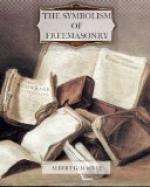The candidate, then, in the second degree of Masonry, represents a man starting forth on the journey of life, with the great task before him of self-improvement. For the faithful performance of this task, a reward is promised, which reward consists in the development of all his intellectual faculties, the moral and spiritual elevation of his character, and the acquisition of truth and knowledge. Now, the attainment of this moral and intellectual condition supposes an elevation of character, an ascent from a lower to a higher life, and a passage of toil and difficulty, through rudimentary instruction, to the full fruition of wisdom. This is therefore beautifully symbolized by the Winding Stairs; at whose foot the aspirant stands ready to climb the toilsome steep, while at its top is placed “that hieroglyphic bright which none but Craftsmen ever saw,” as the emblem of divine truth. And hence a distinguished writer has said that “these steps, like all the masonic symbols, are illustrative of discipline and doctrine, as well as of natural, mathematical, and metaphysical science, and open to us an extensive range of moral and speculative inquiry.”
The candidate, incited by the love of virtue and the desire of knowledge, and withal eager for the reward of truth which is set before him, begins at once the toilsome ascent. At each division he pauses to gather instruction from the symbolism which these divisions present to his attention.
At the first pause which he makes he is instructed in the peculiar organization of the order of which he has become a disciple. But the information here given, if taken in its naked, literal sense, is barren, and unworthy of his labor. The rank of the officers who govern, and the names of the degrees which constitute the institution, can give him no knowledge which he has not before possessed. We must look therefore to the symbolic meaning of these allusions for any value which may be attached to this part of the ceremony.
The reference to the organization of the masonic institution is intended to remind the aspirant of the union of men in society, and the development of the social state out of the state of nature. He is thus reminded, in the very outset of his journey, of the blessings which arise from civilization, and of the fruits of virtue and knowledge which are derived from that condition. Masonry itself is the result of civilization; while, in grateful return, it has been one of the most important means of extending that condition of mankind.
All the monuments of antiquity that the ravages of time have left, combine to prove that man had no sooner emerged from the savage into the social state, than he commenced the organization of religious mysteries, and the separation, by a sort of divine instinct, of the sacred from the profane. Then came the invention of architecture as a means of providing convenient dwellings and necessary shelter from the inclemencies




